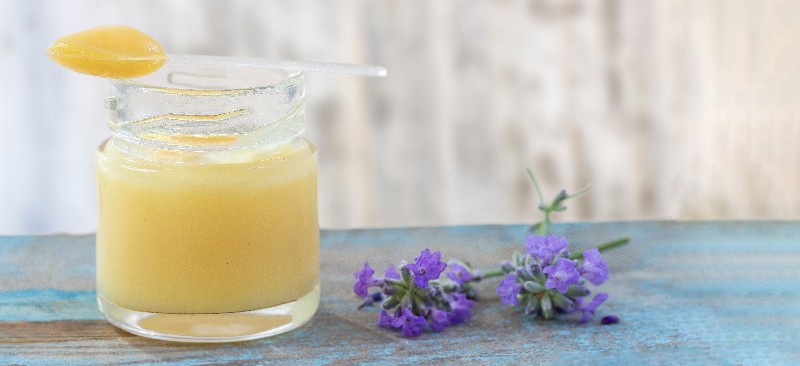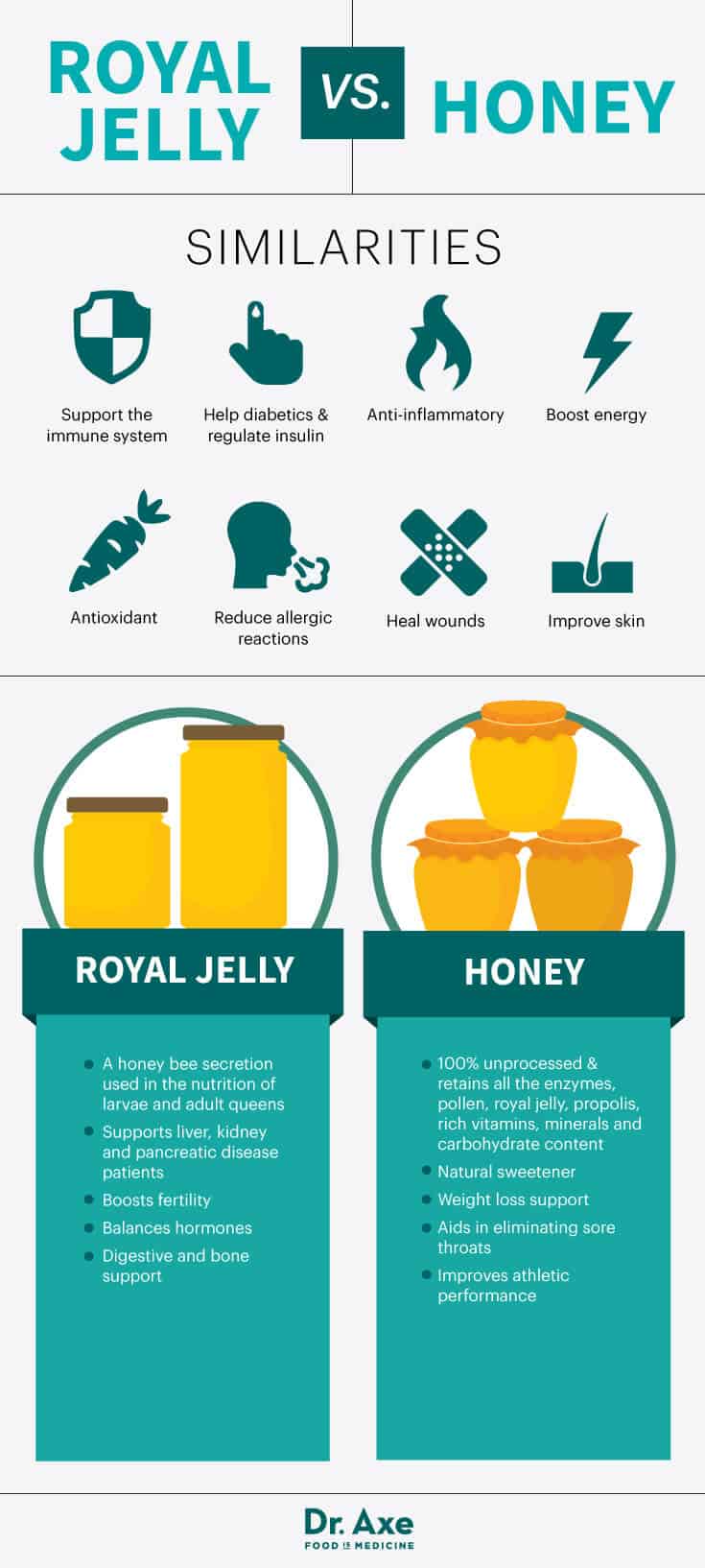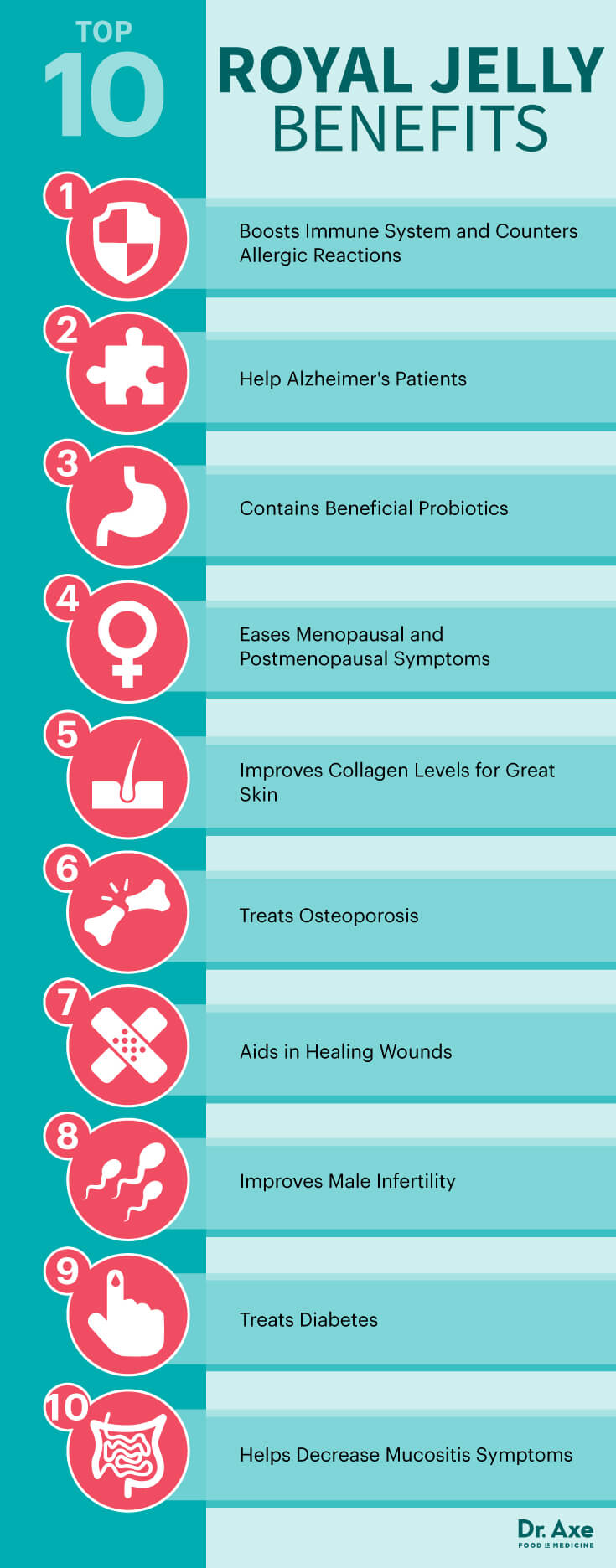The Jelly that Can Improve Male Fertility & Help Fight Cancer (original) (raw)
Fact Checked
This Dr. Axe content is medically reviewed or fact checked to ensure factually accurate information.
With strict editorial sourcing guidelines, we only link to academic research institutions, reputable media sites and, when research is available, medically peer-reviewed studies. Note that the numbers in parentheses (1, 2, etc.) are clickable links to these studies.
The information in our articles is NOT intended to replace a one-on-one relationship with a qualified health care professional and is not intended as medical advice.
This article is based on scientific evidence, written by experts and fact checked by our trained editorial staff. Note that the numbers in parentheses (1, 2, etc.) are clickable links to medically peer-reviewed studies.
Our team includes licensed nutritionists and dietitians, certified health education specialists, as well as certified strength and conditioning specialists, personal trainers and corrective exercise specialists. Our team aims to be not only thorough with its research, but also objective and unbiased.
The information in our articles is NOT intended to replace a one-on-one relationship with a qualified health care professional and is not intended as medical advice.
Royal Jelly Health Benefits (No. 2 Is Brain Food)
December 26, 2019
- What Is Royal Jelly?
- Nutrition Facts
- Royal Jelly vs. Honey
- Health Benefits
- Supplement Dosage
- Risks and Side Effects

Royal jelly sounds prestigious, stirring up curiosity, and for good reason. The name alone can draw you in, but what else makes it appealing? Well, for starters, it’s been reported to have antioxidant, anti-diabetic, antibacterial and wound-healing properties.
Can humans eat royal jelly? You bet. Just like some of the top uses for honey, royal jelly is used for a number of health reasons, such as an asthma natural remedy, healthy bone development, an age-defying treatment and to boost the immune system, to name a few. It’s even been noted as a possible way to inhibit cancer growth.
What Is Royal Jelly?
Royal jelly (RJ) is a nutritious substance produced by young nurse bees. It contains significant amounts of amino acids (the “building blocks of protein”) that are important for cell growth and reproduction.
As a honey bee secretion, the jelly is used in the nutrition of bee larvae and adult queen bees. This proteinaceous secretion is derived from the hypopharyngeal and mandibular glands of young worker bees. It’s the sole food fed to the queen by nurse/worker bees throughout her lifetime and is also fed to all young larvae for the first three days after hatching.
This “bee fuel” possesses various biological attributes beneficial for human health, such as antioxidant activities, antibacterial effects, enhancement of immune activity and anti-tumor effects.
What are the benefits of royal jelly? Compared to honey, this product has not been studied nearly as extensively. What we know from anecdotal evidence and limited studies is that benefits and uses may include:
- Antioxidant and anti-inflammatory effects
- Kidney, pancreatic and liver disease support
- Healthy skin
- Energy and vitality
- Healing wounds
- Fertility support
- Digestive support
- Bone support
- Diabetic support
- Cognitive support/protection against neurodegenerative disorders
Nutrition Facts
RJ contains proteins, carbohydrates, fats, free amino acids, vitamins and minerals.
Touted as “the fountain of youth and beauty,” it’s a good source of vitamin B5 and other B vitamins, biotin, inositol, folate, nucleic acids, gamma globulin and 17 different amino acids, including the eight essential amino acids that the human body cannot produce.
And there’s more. RJ also contains potassium, magnesium, calcium, copper, sulfur, zinc, iron and manganese.
According to studies, it contains about 60 percent to 70 percent water, 12 percent to 15 percent proteins, 10 percent to 16 percent sugar, 3 percent to 6 percent fats, and 2 percent to 3 percent vitamins, salts and amino acids. Its composition varies depending on geography and climate.
Honeybee (Apis mellifera) RJ has a long history in human medicine because of its health-protecting properties. The lipids (fat) it contains are composed of mostly (aliphatic) fatty acids, almost all of which are present as free fatty acids.
Most fatty acids in RJ are medium-chain fatty acids. There’s some evidence that these lipids are useful as preventive and supportive medicines with functionalities that include potential inhibitors of cancer growth, immune system modulators, alternative therapies for menopause, skin-aging protectors and more.
Related: Foods High in Sulfur and Their Benefits
Royal Jelly vs. Honey
Did you know that royal jelly is actually an important step in becoming a queen bee? Just like honey, RJ originates from beehives — however, bees produce these substances for very different reasons.
While honey provides energy for the worker bees, RJ acts as the main source of food for the colony’s queen. A royal treatment indeed, and likely how the name was derived.
Uniquely, RJ is the only determining factor in the development of a queen bee from an ordinary worker bee. The hive selects its next queen when she’s just a few days old. Once she’s been chosen, the queen bee to-be starts getting fed RJ and eats it for the rest of her life. And all those nutrients are what make her the biggest bee on the hive living longer than the other bees.
Both royal jelly and raw honey have been harvested for centuries for both similar and different reasons. RJ is typically used as a nutritional supplement, while we all know honey as a delicious natural sweetener for our morning toast or afternoon tea. There are numerous proven and potential health benefits of royal jelly and honey, many of which are similar.
Raw honey is 100 percent unprocessed, meaning it’s pure, natural, unpasteurized and unadulterated. It retains all the enzymes, pollen, royal jelly, propolis, rich vitamins, minerals and carbohydrate content in this form. Honey is known for benefits including:
- Helping regulate insulin
- Anti-inflammatory effects
- Antibacterial power for the skin
- Sore throat remedy
- Building immunity to local allergens
- Antioxidant effects
- Healing wounds

Health Benefits
1. Counters Allergic Reactions
According to a 2011 study published in the journal International Immunopharmacology, royal jelly can help boost the immune system.
In the study, histamine response to allergens was immediately suppressed, showing that it may help relieve seasonal allergy symptoms. However, more research is still needed to completely validate its allergen-suppressing abilities.
2. Supports Cognitive Function & May Help Alzheimer’s Patients
Royal jelly has been touted as brain food due to its ability to improve cognitive functions. While it’s not a magic bullet for becoming smarter, it improve your short-term memory, your ability to learn new things, and even your motor skills.
Recent research indicates royal jelly may improve short-term memory because it’s demonstrated to have a beneficial role on neural functions. We know that Alzheimer’s disease is associated with impairments of learning and memory, which is why this study published in Advanced Biomedical Research was designed to examine the effect of royal jelly on spatial learning and memory.
Because the brain tissue contains a lot of unsaturated fatty acids that are especially vulnerable for free radical attacks, the antioxidant substances found in royal jelly can play an important role in prevention and cure of neurodegenerative diseases. That includes working as a potential Alzheimer’s natural treatment.
3. Contains Beneficial Probiotics
Royal honey appears to have a valuable effect as a source of bifidobacteria, which is the beneficial bacteria that supports the health of the gastrointestinal tract, making it a useful probiotic.
Research demonstrates it may have other effects such as immune enhancement and anti-carcinogenicity, due to its ability to enhance the growth, activity and viability of bifidobacteria.
4. Eases Menopausal and Postmenopausal Symptoms
There’s evidence that taking royal jelly can help reduce menopausal symptoms and improve feelings of well-being in menopausal women.
The combination of royal jelly, evening primrose oil, damiana, and ginseng are often used together to help decrease menopausal symptoms like fatigue and mood swings.
5. Improves Collagen Levels for Great Skin
Why use royal jelly for skin health? A study conducted at Kyung Hee University in Korea reports that royal jelly regulates skin photoaging following exposure to ultraviolet-B radiation. The anti-aging effects on the skin were assessed by determining the collagen content and epidermal thickness of skin tissue.
The level of procollagen type I protein was increased in the subjects that were fed with a dietary supplement containing 1 percent royal jelly extract. These findings indicate that royal jelly may protect against skin aging by enhancing collagen production.

6. Helps Treat Osteoporosis
Research done at Erciyes University in Turkey aimed to investigate whether RJ and bee pollen reduce the bone loss due to osteoporosis. Bone mineral density was measured, tissue samples were taken and blood samples were collected for the study.
There were significant differences found that showed positive bone health in the lumbar spine and proximal femur in the RJ and bee pollen groups. Bone tissue calcium and phosphate levels were higher, as well, indicating that RJ and bee pollen may decrease bone loss due to osteoporosis.
7. Aids in Healing Wounds
Honey has long been known as an aid in wound healing. Studies reveal that there are also important benefits of royal jelly for skin, especially for wound healing.
In a 2010 study, it was found that RJ treatment significantly accelerated the migration of fibroblasts within 24 hours, demonstrating that it can enhance connective tissue healing by supporting production of collagen and other fibers. It also seems to alter levels of various lipids involved in the wound-healing process.
Additionally, it can help to treat ulcers affecting the skin, according to certain studies demonstrating that RJ dressings may be an effective method for treating diabetic foot ulcers.
8. Improves Male Infertility
Research investigating royal jelly fertility benefits that was published in the Avicenna Journal of Phytomedicine found it may benefit male fertility in several ways, according to effects in male mice.
Sperm count, sperm motility, viability, maturity and DNA integrity were analyzed in the study. RJ was found to improve sperm parameters, testosterone levels and malondialdehyde production in the mice.
9. Supports Metabolic and Cardiovascular Health
According to Sloan Kettering Cancer Center, RJ has been shown to lower blood pressure, lower cholesterol levels, and reduce inflammation in laboratory and animal studies.
According to animal studies, RJ is capable of providing antioxidant effects that defend against insulin resistance and oxidative stress, which are the root causes of most metabolic problems. It may decrease reabsorption of cholesterol in the digestive tract and increase its excretion in the bile.
In a randomized clinical trial, 40 patients with type 2 diabetes were assigned to receive either 10 grams fresh royal jelly or a placebo after overnight fasting. Though more studies are needed, findings showed that royal jelly had significant and immediate effects on glycemic factors in patients with type 2 diabetes.
10. Helps Decrease Cancer Treatment Symptoms (Including Mucositis)
RJ may help aid in healing in patients receiving radiotherapy and chemotherapy. Combined with standard mouthwash therapy, it was shown to improve symptoms of of mucositis, a condition that causes the mouth or gut to become sore and inflamed.
Data suggests that topical application of films that contain RJ can have a healing effect on severe oral mucositis due to its its free radical -scavenging, anti-inflammatory and antioxidative activities.
While it can improve health markers in adult men and women with cancer, some experts claim that it hasn’t been shown to treat cancer. That being said, certain experiments have demonstrated that RJ inhibits cell proliferation and stimulates apoptosis in various types of malignant cells.
Supplement Dosage
Look for royal jelly supplements and topical products at your local health food store. Royal jelly comes in several forms including:
- Raw royal jelly. You can eat it raw, add it to honey as a spread, or use it in your tea or morning smoothie.Capsules which contain royal jelly powder that are taken by mouth. The flavor of royal jelly is mostly described as astringent, dry, slightly bitter and leaving an aftertaste. When made into tablets or capsules, it may be mixed with fillers so, as read labels to find a good quality product.
- Freeze-dried royal jelly, which is more shelf-stable and maintains most of its benefits. Freezing helps better maintain its quality compared to storing at room temperature and refrigerating it.
- Gel-like and liquid formulations. These may contain preservatives and even honey to improve the flavor, so check ingredient labels.
- Topical products that are applied to your skin.
The appropriate dose of RJ depends on several factors, such as the user’s age, health and several other conditions. At this time there is not enough scientific information to determine a standard dose. While dosage recommendations vary, it’s generally advised to take between 300–6,000 milligrams per day of RJ powder capsules while monitoring your reaction.
Start with a low royal jelly dosage since this substance is very potent. You only need about half a teaspoon per day to gain its many benefits and receive adequate B vitamins.
Risks and Side Effects
Is Royal Jelly dangerous? Most people tolerate it well when using it for short periods time, such as four weeks or less. However be sure to follow directions on product labels, and to consult your pharmacist or physician before using it if you have any chronic health problems (such as diabetes or cancer).
Some people have reported side effects when consuming RJ such as weight gain, facial rash and gastrointestinal discomfort (usually when consuming high doses).
The aftertaste of royal jelly is sometimes equated with extremely low doses of bee venom, giving a numbing or tingling feeling to the tongue and mouth. For this reason people who have severe allergic reaction to bee venom should not be given royal jelly.
You should avoid royal honey if:
- You have estrogen receptor-positive breast cancer because it can stimulate growth of cancer cells.
- You take blood thinners such as warfarin.
- You are taking cholesterol-lowering medications.
- Speak to your doctor first if you are pregnant or breastfeeding.
It’s important to note that several cases of anaphylaxis, asthma and hemorrhagic colitis have been reported with use of royal jelly. People who have severe allergic reactions to bee venom should not be given royal jelly.
Final Thoughts
- What is in royal jelly? It’s a honey bee secretion that provides nutrition for bee larvae and adult queen bees.
- RJ contains proteins, carbohydrates, fats, vitamins and minerals. It’s rich in protein B vitamins, folate and certain fatty acids.
- Royal jelly benefits may include: reducing allergic reactions, providing probiotics for gut health, easing menopausal and postmenopausal symptoms, improving collagen levels for great skin, aiding in wound healing, benefiting male fertility, supporting metabolic health, and decreasing mucositis symptoms.
Royal Jelly Health Benefits (No. 2 Is Brain Food)
Total Time: 10 minutes
Serves: 2-3 applications
Ingredients:
- 2 teaspoons royal jelly freeze dried powder
- 1 teaspoon raw organic honey
- 1 tablespoon bentonite clay
- 2 tbs witch hazel
- 4 drops lavender essential oil
- 2 drops vetiver essential oil (optional)
Directions:
- Using a small glass or ceramic bowl, combine the royal jelly and the bentonite clay.
- Add the honey, the essential oils, and witch hazel.
- Blend well until you have created a smooth paste.
- Cover the face and neck, and let sit for 15-20 minutes.
- Rinse well with warm water, pat dry and apply this homemade facial serum or your favorite natural moisturizer.
- Enjoy the soft, glowing, acne-free skin that this mask helps provide!
- You can store the mask in a glass container in the refrigerator for a few days.